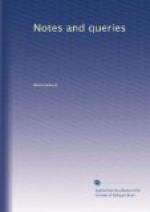Amongst the numerous correspondents and readers of your very interesting little work, there may yet be living some who were scholars in the above institution during the last ten or fifteen years of the last century, coevals, or nearly so, with Richards, afterwards of Oriel College, author of a prize poem, Aboriginal Britons, and one of the Bampton Lecturers; Middleton, afterwards Bishop of Calcutta; Trollope, afterwards Master of the Grammar School; Barnes, afterwards connected with the Times; Stevens, Scott (poor Scott!), Coleridge, Lamb, Allen, White, Leigh Hunt, the two brothers Le G. Favell, Thompson, Franklin, &c., pupils of old James Boyer, of flogging celebrity.
If so, can any of them furnish me with the words of an old song, then current in the school, relating to the execution of the Earl of Derwentwater in the rebellion of 1715, of which the four following lines are all that I remember:
“There’s fifty
pounds in my right pocket,
To be given to
the poor;
There’s fifty pounds
in my left pocket,
To be given from
door to door.”
Of another song, equally popular, less pathetic, but of more spirit-stirring character, can any one supply the remainder?
“As our king lay musing
on his bed,
He bethought himself once
on a time
Of a tribute that was due
from France,
That had not been paid for
so long a time.
“Oh! then he called
his trusty page,
His trusty page then called
he,
Saying, ’You must go
to the king of France,
To the king of France right
speedily.’”
NEMO.
* * * * *
WATCHING THE SEPULCHRE—DOMINUS FACTOTUM—ROBERT PASSELLEW.
Allow me to offer a query or two respecting which I shall be glad of any information your numerous correspondents may be able to furnish.
1. In Fuller’s History of Waltham Abbey, pp. 269. 274., Nichol’s edition, 1840, we have the following entries from the churchwarden’s accounts:
“Anno 1542, the
thirty-fourth of Henry viii. Imprimis.
For
watching the sepulchre,
a groat.”
“Item, for watching the sepulchre, eight pence.”
The last entry occurs in “Anno 1554, Mariae primo,” but Fuller adds, “though what meant thereby, I know not.” Can any satisfactory information be furnished which will explain the custom here alluded to? {319}
2. In the same work, page 278., a passage occurs, which not only explains the meaning of the term factotum, but furnishes matter for another query. The passage is this; speaking of “eminent persons buried” at Waltham Abbey, he says: “we spoil all, if we forget Robert Passellew, who was dominus fac totum in the middle—and fac nihil towards the end—of the reign of Henry III.” Some parasites extolled him by allusion to his name, pass-le-eau, (that is “passing the pure water,”) the wits of those days thus descanting upon him:




